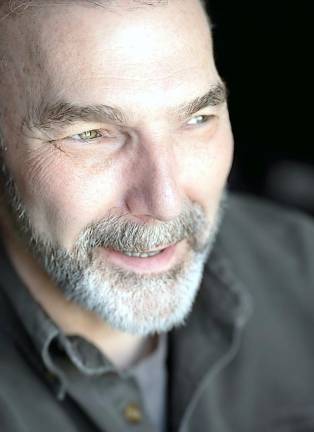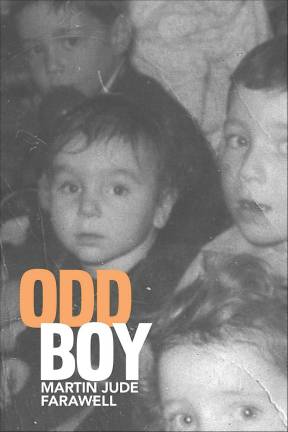How poetry saved a man from his parents' searing violence
Milford. Martin Jude Farawell’s stunning full-length collection of poetry, "Odd Boy," is a journey through pain and loneliness, and his lifelong determination to resist becoming an angry man.


The haunted eyes of the boy on the cover of "Odd Boy," the first full-length collection of poetry by Martin Jude Farawell of Milford, give a glimpse of a child who was brought up with anger and grew up feeling “odd” -- so much different than the way others feel.
That boy struggled to overcome the violence meted out by his parents, sometimes willing himself into invisibility to escape. Yet escape he does, as he renounces an aggressive way of being and becomes a gentler man. Farawell captures that journey in beautiful, lyrical language that paints pictures so vivid, the reader is instantly immersed.
Farawell’s love of language started around age 10, the first time he remembers being “very vividly being caught up in a book,” while reading the story of Man O’ War.
“I really felt that kind of complete immersion that inspired me to read more,” he said.
The experience turned him into a voracious reader.
“Before then, reading was something assigned at school," he said.
He started writing early, too. In the third or fourth grade of the Catholic school he attended, a weekly composition class was his favorite activity.
“Kids groaned, and I was deeply shocked that this wasn’t everybody else’s favorite subject," he said.
He wrote little stories and his first poem at age 10. One winter a couple years later, he was laid up at home with bronchitis and pneumonia. He began writing poems and songs.
“Then when I was 13 I had a teacher, Mr. Meyers, who did a big poetry unit in English class,” he said. “That’s the first time I really got engaged in reading and writing poetry and thinking it was something I might do.”
Around age 15 Farawell’s first poem, a kind of memorial to his Uncle Jerry, who was a gentling influence, was published in a local newspaper. Someone -- to this day he’s not sure who -- sent it to the local paper, and it was published.
Has poetry changed since he began writing?
“Yes, I think it’s always changing," he said. "The struggle for me is to try and answer the question: on this day and this time, what is a poem for me? What is possible to do in a poem? Your assumptions change and you surprise yourself sometimes — what you may have assumed a poem is supposed to be or do— sometimes in the process it goes someplace else, where none of your other poems have gone. It changes your idea of what a poem can be."
Writing a poem is something that takes time, practice and dedication, he said. It requires “a lot of revisions and willingness to be okay with failure, accept that and move on. Sometimes a first draft will come quickly, and in one day I’ll feel I have a solid draft. And other times it takes a long time to gestate, like when writing about the same topic or subject. So I may write a whole series of poems over days or months or years.”
How does a poem begin?
“I’ve been writing a long time –so any way you can imagine a poem starts, I’ve done it,” Farawell said. “Sometime a memory, sometimes an image, sometimes a dream, sometimes a phrase will pop into my head.”
Sometimes a poem will reflect what’s on his mind, like a social issue or personal problem.
“One of the ways I think through things to try to understand and explore them is through writing," he said. "And sometimes I’ll be reading another poet or a novel or listening to music and something will strike me that needs a response. I hope that putting the poems out into the world matters to people, as poems I’ve read mattered to me."
"Odd Boy" is available at Sibling Rivalry Press (siblingrivalrypress.com) and from Amazon. Farawell may be contacted at martinfarawell.com.
A life in letters
Farawell is also a playwright as well as the executive director of the Dodge Poetry Festival, the largest poetry event in North America. He taught in Middletown at SUNY Orange for five years.
Other poems by Farawell appear in "Genesis: A Sequence of Poems" (New Spirit Press, 1995) and in these anthologies: "Outsiders: Poems About Rebels," "Exiles," and "Renegades" (Milkweed Editions, 1999); "Prayers to Protest" (Pudding House Publications, 1997); "Under a Gull's Wing" (Down the Shore Publishing, 1996), "Writing Our Way Out of the Dark" (Queen of Swords Press, 1996)
Duet, by Martin Jude Farawell
My father was predictable in his rages.
When the shadows in his eye sockets deepened
Until the shadows took his eyes
And the skin above his jawline
Was sucked gaunt against his teeth
As if he’d chew his own cheeks off.
Then I knew the fleshless death’s head
That harrowed my sleep
Was the skull behind my father’s facet
That hated him, hated his life,
That would bite my spine in half
If not for my magic gift of invisibility.
But it was she,singing Rosemary Clooney in the kitchen,
Fox-trotting with a colander of glistening green beans
Who would snap
And the metal pot or frying pan,
The bread board or rolling pin
Would leap into her fist and swing her
Skirling toward me, too fast
For me to vanish, who beat
Her music into my spine
Until I sang.
'The paradox of giving what one never received'
In a review published on Sept. 16 by Toti O’Brien in Atticus Review (atticusreview.org), O’Brien says:
"Odd Boy" refutes the inexorability of cause and consequence — it entails the paradox of giving what one never received.
"Odd" is the boy who doesn’t dare swing from the rope, or join the drunken song of peers around the bonfire, or carve his name besides that of the girl he loves. He is cast off because he won’t perpetuate the aggressiveness tied to maleness and inherited from fathers, brothers, also modeled on mates. He can’t be and won’t be an angry man.
Part two builds upon the same themes — loneliness, pain, defiance, revolt — from a complex vantage point of present reflection intertwined by sharp, indelible memories. "Odd" is shyness — fear of self-expression and contact, due to lack of nurturing...
"Odd" is the child willing himself out of his body to avoid witnessing the abuse inflicted upon it... If he becomes invisible to avoid Father’s rage, he is not fast enough to flee Mother’s. In the night he overhears his parents’ fight, but no matter how he prays "there is no grace."